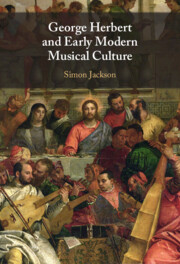Book contents
- George Herbert and Early Modern Musical Culture
- George Herbert and Early Modern Musical Culture
- Copyright page
- Dedication
- Contents
- Figures
- Musical Examples
- Preface
- Acknowledgements
- Introduction
- Chapter 1 Measuring Well
- Chapter 2 Communities of Voices
- Chapter 3 The Visual Music of the Masque
- Chapter 4 Concord and Consent
- Chapter 5 Double Motion
- Chapter 6 Singing the Psalms
- Epilogue
- Notes
- Bibliography
- Index
Chapter 1 - Measuring Well
Ethics and Incarnational Music
Published online by Cambridge University Press: 11 November 2022
- George Herbert and Early Modern Musical Culture
- George Herbert and Early Modern Musical Culture
- Copyright page
- Dedication
- Contents
- Figures
- Musical Examples
- Preface
- Acknowledgements
- Introduction
- Chapter 1 Measuring Well
- Chapter 2 Communities of Voices
- Chapter 3 The Visual Music of the Masque
- Chapter 4 Concord and Consent
- Chapter 5 Double Motion
- Chapter 6 Singing the Psalms
- Epilogue
- Notes
- Bibliography
- Index
Summary
Chapter 1 turns to Augustine’s musico-poetic treatise De musica to elucidate the theoretical ideas about music and poetry that lie behind Herbert’s musical practices. Herbert is known to have greatly valued Augustine’s works, yet few critics have engaged the implications of Augustine’s musico-poetic treatise on Herbert’s work. For both Augustine and Herbert, music and poetry were arts of ‘moving and measuring well’. Expressive musical and poetic performance was both an aesthetic and an ethical act, with implications for the health of body and soul. For both writers, this metaphysical understanding of the nature of music was derived from practical experiences of music-making. Reading The Temple in light of De musica reframes our understanding of Herbert’s poetry of affliction as a tuning of the individual and provides the reader with an overview of the theological ramifications of music that this book explores.
Keywords
- Type
- Chapter
- Information
- George Herbert and Early Modern Musical Culture , pp. 24 - 49Publisher: Cambridge University PressPrint publication year: 2022

